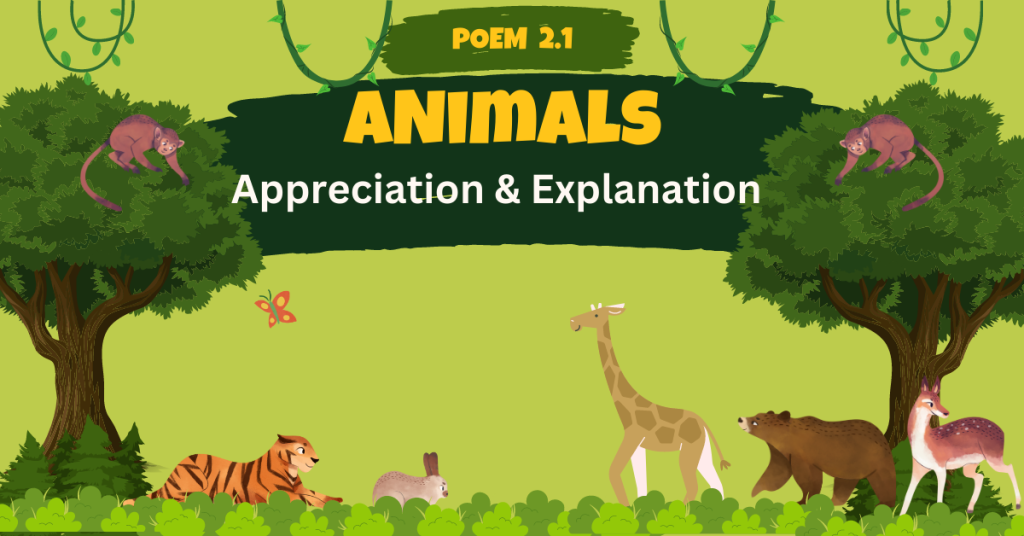Animals Appreciation and Explanation 10th Class KUMARBHARATI / CBSE
The poem, Animals is written by the great poet Walt Whitman. The poem is about how human beings are so upset and dissatisfied with what they have but animals, they don’t do that because they are calm and satisfied with what they have. So, the poet wants to transform into an animal. The poem Animals will be asked to solve the extract and to write an appreciation of the poem for the 10th class.
Introduction: Animals Appreciation and Explanation
Walt Whitman (1819-1892): A major figure in early American poetry. In an age when all poetry was rhymed and metrical, Whitman made a break with tradition and wrote a revolutionary new kind of poetry in free verse. He was a nonconformist in all respects, including his social life.
The poet tells us that he feels more at home with animals than humans, whom he finds complicated and false.
Poem: Animals
I think I could turn and live with animals, they are
so placid and self-contain’d
I stand and look at them long and long.
They do not sweat and whine about their condition,
They do not lie awake in the dark and weep for their sins,
They do not make me sick discussing their duty to God,
Not one is dissatisfied, not one is demented with
the mania of owning things.
Not one kneels to another, nor to his kind that
lived thousands of years ago,
Not one is respectable or unhappy over the whole earth.
So they show their relations to me and I accept them,
They bring me tokens of myself, they evince
them plainly in their possession
I wonder where they get those tokens,
Did I pass that way huge times ago and negligently drop them?
-Walt Whitman
Glossary:
turn : (here,)transform
placid : not easilyupset
self-contain’d : self-sufficient
make me sick :disgust me
demented : mad
mania : craze
respectable : (here,)too happy andsatisfied
evince : show
tokens : (here,)virtues like innocencesimplicity, contentmentetc.
Explanation: Animals Appreciation and Explanation
First stanza:
I think I could turn and live with animals, they are
so placid and self-contain’d
I stand and look at them long and long.
- At the beginning of the poem, the poet thinks that he could transform into an animal and live with them because animals are very calm, self-sufficient, and satisfied with what they have, the poet wants to tell us that human beings are not always calm, self-sufficient and satisfied with what they have. That’s why the poet wants to live with animals and he wants to sand and look at animals for long periods at how they live and survive with the efficient things they have.
- In the first stanza the poet wants to tell that human beings are always greedy with their possessions but animals are not that’s why he says that he stands and observes their livelihood.
Second stanza:
They do not sweat and whine about their condition,
They do not lie awake in the dark and weep for their sins,
They do not make me sick discussing their duty to God,
Not one is dissatisfied, not one is demented with
the mania of owning things.
- In the second stanza, the poet tells that animals do not work very hard for possessions even if they do not cry over what their condition may be. Animals live their life in the present condition, whatever it may be. Animals do not lie awake in the night and cry for their sins but human beings lie awake late at night and cry over the sins which they committed in their life. The poet tells that animals do not disgust him by discussing the duty to pray the God but human beings always go on discussing their duties to God.
- Further, he tells that not one animal is dissatisfied and does not become mad and crazy (mania) for its belongings. It means every animal is satisfied with what it belongs to and will not become greedy for possessions. In contrast, human beings always become crazy for the materialistic things in their life but animals do not.
Third stanza:
Not one kneels to another, nor to his kind that
lived thousands of years ago,
Not one is respectable or unhappy over the whole earth.
So they show their relations to me and I accept them,
They bring me tokens of myself, they evince
them plainly in their possession
I wonder where they get those tokens,
Did I pass that way huge times ago and negligently drop them?
- In the third stanza, the poet tells that in the life of animals, they do not kneel in front of others nor give honour to other’s kind or great things which they have thousands of years ago. The poet wants to tell that human beings always bow in front of others because of others’ greatness which they have observed from ancient times. In short, all animals are equal to each other and no one is superior to the other.
- Animals are not respectful to each other and are unhappy in their animal kingdom. Everyone is respectful as they are. The poet tells that animals meet with the same qualities that he has, that’s why the poet says that so animals show their relations to him and he accepts them as they are. The poet tells that Animals show their qualities as they match his qualities as they are. They indicate such qualities as them plainly in their possession.
- In the last, the poet wonders from where animals get those qualities. He questioned those qualities once human beings have and they passed such qualities to animals over long periods and carelessly or unknowingly drop such qualities to animals.

Appreciation: Animals Appreciation and Explanation
- The poem, Animals is written by the great poet Walt Whitman. The title of the poem, Animals is apt and suitable to the theme of the poem. In the poem, the poet wants to tell how animals are living their life and how human beings are living their life. The poet tells us that he feels more at home with animals than humans, whom he finds complicated and false.
- The theme/ central idea of the poem is about how we should live our life. The poet wants to be an animal because animals live their life without being tense and upset. In life, animals do not work very hard for their possession and do not cry for their condition.
- Animals do not do any sins in their life so that they do not lie awake at night in the fear of sins. Animals do not have any discussion on to pray to God. Animals are self-content with what they belong and they do not follow madly or crazily for owning things. Animals do not bow in front of anyone, they have equality among themselves. In them, no one is superior to the other.
- The poem is free verse. It has not any rhyming words or rhyme scheme. In the poem, there are figures of speech such as Alliteration, Repetition, Hyperbole, Metaphor, and Personification to make the poem more effective. The poem is highly effective and the tone of the poem is optimistic about life. The language of the poem is simple and meaningful.
- My favourite line in the poem is “ they do not awake in the dark and weep for their sins.” the line is very meaningful and it has great moral. The poet wants to tell human beings that if we committed any crime for our greed, we have to face such things in life and in that intention the person lies awake till late at night and cries for the sins which he has committed.
- I like the poem very much and I am inspired by the poet’s thoughts. In this poem, the poet shows how we should live our lives as animals. In life, we should live as everyone equal and everyone is respectful to each other. The poet wants to tell us that we should not regret and be upset about what we have, we should live happily and optimistically.
You May also learn About:







